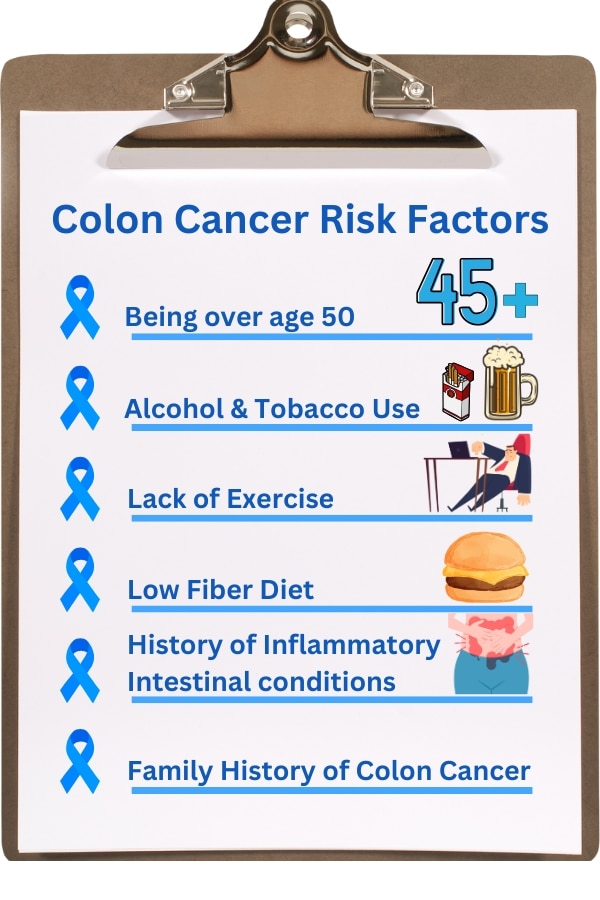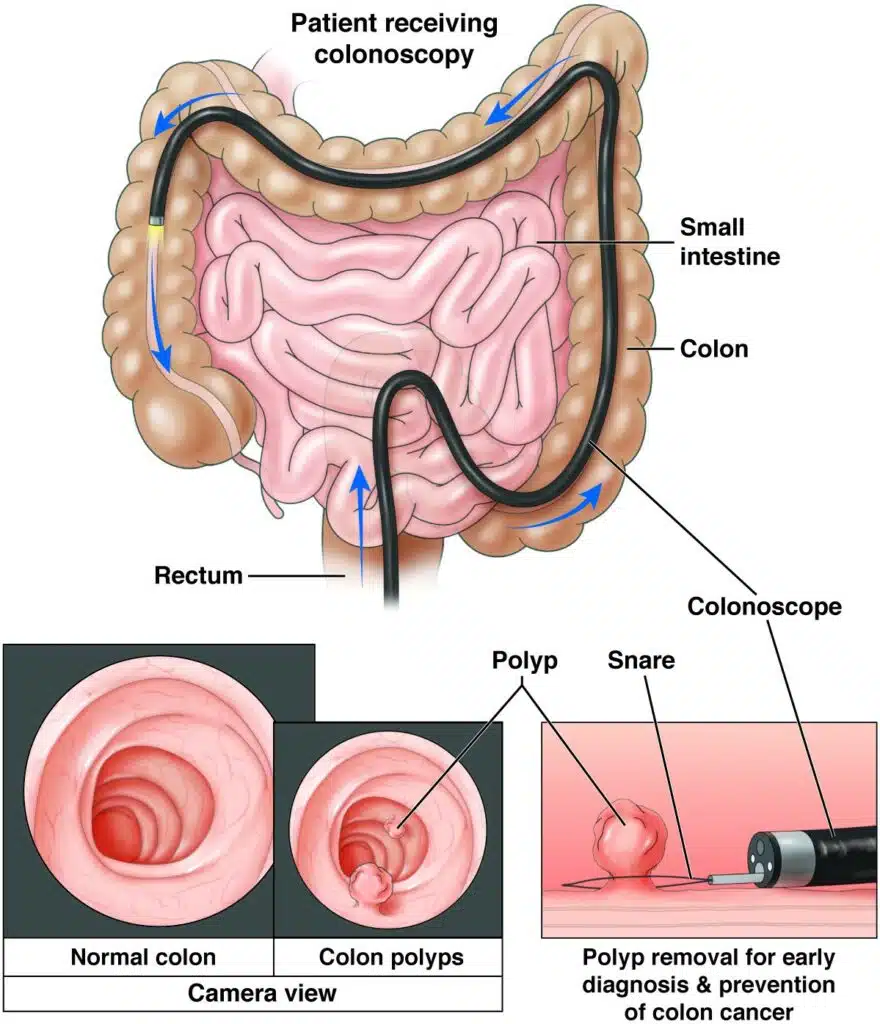Colorectal cancer continues to be a major problem in the United States. This cancer affects any portion of the large intestine, or the colon in medical terms. The rectum involves the last 15 cm of the colon. In 2023, colorectal cancer was the fourth leading overall cause of cancer and second leading overall cause of cancer deaths. It is estimated that about 1 in 24 people will develop colorectal cancer at some point in their lifetime.

There are several risk factors for development of colorectal cancer:
- Being overweight or obese
- Not being physically active
- Smoking
- Diets high in red meats (beef, pork, lamb) and processed meats (such as hot dogs and some luncheon meats) or cooking meats at high temperatures (frying, broiling or grilling)
- Moderate to heavy alcohol use
- Increasing age
- Personal history of polyps or colorectal cancer
- Personal history of inflammatory bowel disease
- Family history of colorectal cancer or polyps, especially before age 60
- Inherited syndromes such as Lynch syndrome or Familial Adenomatous Polyposis
Symptoms of colorectal cancer can be vague, and many patients don’t have any symptoms at all, especially in the early stages of disease. The more common symptoms include:
- Blood in your stool or very dark stools
- Changes in your bowel habits, both constipation and diarrhea/loose stools
- Changes in the shape of your stool, typically to very thin stools
- Feeling bloated
- Persistent cramps
- Fatigue
- Unexplained weight loss
- Anemia
Colorectal cancer typically begins as a polyp, which is a growth on the wall of the colon. Fortunately, most of these cases develop over the course of several years and there are multiple options for screening to catch these polyps before they turn into cancer. The recommended age to start screening is age 45 (previously it was 50) for people who are not at increased risk for colon cancer. Some people should start screening at an earlier age, typically depending on family history or personal history of certain diseases or syndromes. Talk to your primary care provider to determine when you should start screening for colorectal cancer. Here are the most common screening options:
Colonoscopy: This is the gold standard screening option, and it is typically fully covered by your health insurance. This is the only test that both detects and prevents colorectal cancer. For this study, you do a bowel prep to clean out your colon. A colonoscope is then inserted through the anus and the wall of the entire colon is visually inspected. The major benefit of colonoscopy is any polyps can be removed and anything abnormal can be biopsied. The procedure takes about 20 minutes and is typically done with conscious sedation. This is the most accurate screening test and can find up to 95% of large polyps (>6 mm) as well as almost all cancerous lesions in the colon and rectum. If no polyps are found, the study should be repeated in 10 years. If adenomatous polyps are found, the study will likely need to be repeated in 3-5 years depending on the number and type of polyps found.
Patients meeting certain criteria can request a colonoscopy with a Lakeview Surgeon with our online Colonoscopy Request Form, or schedule online. After scheduling or requesting an appointment, a Lakeview surgery scheduler will reach out to you with important information.

Stool DNA test (Cologuard test): This is an at-home test that is relatively new to the market. For the test, you collect a stool sample at home. The test is mailed to a lab for testing which detects blood in your stool and DNA changes in cells that can indicate the presence of colorectal cancer. The test can detect up to 92% of colon cancers but only about 42% of large polyps. There are also both false positive and false negative results to the test. If your Cologuard test is negative, the recommendation is to repeat the test in 3 years. If your Cologuard test is positive, you will need to have a diagnostic colonoscopy for further evaluation. While the Cologuard test is typically fully covered by your health insurance, a follow-up diagnostic colonoscopy is not fully covered and you may be responsible for some or all of the cost, depending on your insurance plan. This study is not for people at increased risk of colorectal cancer. It is not an appropriate study for someone with a previous history of colorectal polyps, colorectal cancer, inflammatory bowel disease, familial cancer syndromes, a family history of colorectal cancer, or anyone with signs or symptoms or colorectal cancer (see above).
Other, less commonly used screening studies:
- Fecal occult blood test
- Fecal immunochemical test
- Virtual colonoscopy (CT colonography)
Sigmoidoscopy
The bottom line is that while colorectal cancer remains a problem, there are options to detect it early and potentially prevent it altogether. All of the general surgeons at Lakeview Clinic perform colonoscopy and are able to treat many of the cases of colorectal cancer discovered during the exam. Talk with your primary care provider about your options and get your screening done!

Dr. Thormodsgard is a Lakeview Clinic General Surgeon. He has a special interest in laparoscopic surgery and is trained in robotic surgery. His practice includes caring for benign and malignant conditions of the colon and small bowel.
